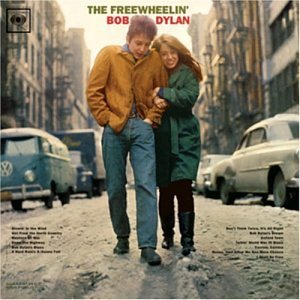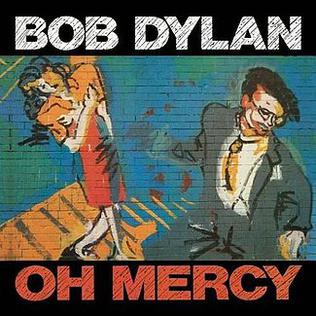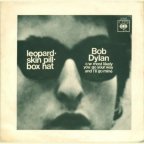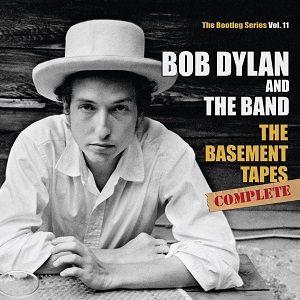
Blonde on Blonde is the seventh studio album by the American singer-songwriter Bob Dylan, released as a double album on June 20, 1966, by Columbia Records. Recording sessions began in New York in October 1965 with numerous backing musicians, including members of Dylan's live backing band, the Hawks. Though sessions continued until January 1966, they yielded only one track that made it onto the final album—"One of Us Must Know ". At producer Bob Johnston's suggestion, Dylan, keyboardist Al Kooper, and guitarist Robbie Robertson moved to the CBS studios in Nashville, Tennessee. These sessions, augmented by some of Nashville's top session musicians, were more fruitful, and in February and March all the remaining songs for the album were recorded.

The Freewheelin' Bob Dylan is the second studio album by the American singer-songwriter Bob Dylan, released on May 27, 1963, by Columbia Records. Whereas his self-titled debut album Bob Dylan had contained only two original songs, this album represented the beginning of Dylan's writing contemporary lyrics to traditional melodies. Eleven of the thirteen songs on the album are Dylan's original compositions. It opens with "Blowin' in the Wind", which became an anthem of the 1960s, and an international hit for folk trio Peter, Paul and Mary soon after the release of the album. The album featured several other songs which came to be regarded as among Dylan's best compositions and classics of the 1960s folk scene: "Girl from the North Country", "Masters of War", "A Hard Rain's a-Gonna Fall" and "Don't Think Twice, It's All Right".

Slow Train Coming is the nineteenth studio album by American singer-songwriter Bob Dylan, released on August 20, 1979, by Columbia Records. It was Dylan's first album following his conversion to Christianity, and the songs either express personal faith, or stress the importance of Christian teachings and philosophy. The evangelical nature of the record alienated many of Dylan's existing fans; at the same time, many Christians were drawn into his fan base. Slow Train Coming was listed at No. 16 in the 2001 book CCM Presents: The 100 Greatest Albums in Christian Music.

Time Out of Mind is the thirtieth studio album by American singer-songwriter Bob Dylan, released on September 30, 1997, through Columbia Records. It was released as a single CD as well as a double studio album on vinyl, his first since The Basement Tapes in 1975.

Oh Mercy is the twenty-sixth studio album by American singer-songwriter Bob Dylan, released on September 12, 1989, by Columbia Records. Produced by Daniel Lanois, it was hailed by critics as a triumph for Dylan, after a string of poorly reviewed albums. Oh Mercy gave Dylan his best chart showing in years, reaching No. 30 on the Billboard charts in the United States and No. 6 in Norway and the UK.

Paul S. Williams was an American music journalist, writer, and publisher who created Crawdaddy!, the first national US magazine of rock music criticism, in January 1966. He was a leading authority on the works of musicians Bob Dylan, Brian Wilson, and Neil Young, and science fiction writers Theodore Sturgeon and Philip K. Dick, for whom he served as the executor of his literary estate. Williams was also the founder of the Philip K. Dick Society, which helped to publish Dick's work and establish his legacy.

"Lay Lady Lay", sometimes rendered "Lay, Lady, Lay", is a song written by Bob Dylan and originally released in 1969 on his Nashville Skyline album. Like many of the tracks on the album, Dylan sings the song in a low croon, rather than in the high nasal singing style associated with his earlier recordings. The song has become a standard and has been covered by numerous bands and artists over the years.

"Leopard-Skin Pill-Box Hat" is a song by the American singer-songwriter Bob Dylan, which was released on the second side of his seventh studio album Blonde on Blonde (1966). The song was written by Dylan, and produced by Bob Johnston. Dylan has denied that the song references any specific individual, although critics have speculated that it refers to Edie Sedgwick, who Dylan had spent time with in December 1965.
"Cold Irons Bound" is a Grammy Award-winning song written by Bob Dylan, recorded in January 1997 and released on September 30, 1997 as the eighth track on his album Time Out of Mind. The song was produced by Daniel Lanois.

Bob Dylan is an American singer-songwriter. Often considered one of the greatest songwriters of all time, Dylan has been a major figure in popular culture over his 60-year career. He rose to prominence in the 1960s, when songs such as "The Times They Are a-Changin'" (1964) became anthems for the civil rights and antiwar movements. Initially modeling his style on Woody Guthrie's folk songs, Robert Johnson's blues and what he called the "architectural forms" of Hank Williams's country songs, Dylan added increasingly sophisticated lyrical techniques to the folk music of the early 1960s, infusing it "with the intellectualism of classic literature and poetry". His lyrics incorporated political, social and philosophical influences, defying pop music conventions and appealing to the burgeoning counterculture.
"It's All Over Now, Baby Blue" is a song written and performed by Bob Dylan and featured on his Bringing It All Back Home album, released on March 22, 1965, by Columbia Records. The song was recorded on January 15, 1965, with Dylan's acoustic guitar and harmonica and William E. Lee's bass guitar the only instrumentation. The lyrics were heavily influenced by Symbolist poetry and bid farewell to the titular "Baby Blue". There has been much speculation about the real life identity of "Baby Blue", with possibilities including Joan Baez, David Blue, Paul Clayton, Dylan's folk music audience, and even Dylan himself.
"Spanish Harlem Incident" is a song written and performed by Bob Dylan which was released on his album, Another Side of Bob Dylan, on August 8, 1964. The song has been described as "a gorgeous vignette" by critics and been praised for its multilayered, poetic dimensions.
"Mississippi" is a medium-tempo country-rock song by the American singer-songwriter Bob Dylan that appears as the second track on his 2001 album Love and Theft. The song was originally recorded during the Time Out of Mind sessions, but was ultimately left off the album. Dylan rerecorded the song for Love and Theft in May 2001.
"Standing in the Doorway" is a song written and performed by the American singer-songwriter Bob Dylan, recorded in January 1997 and released in September that year as the third track on his album Time Out of Mind. The song was produced by Daniel Lanois.

"Lay Down Your Weary Tune" is a song written by Bob Dylan in 1963. Dylan originally recorded it for his album The Times They Are a-Changin', but his version of the song was not officially released until 1985 on the Biograph box set. In the album liner notes, Dylan claims that in the song he was trying to capture the feeling of a Scottish ballad he had just heard on a 78 rpm record. The specific ballad Dylan was referring to has not been identified, but speculation includes "The Water Is Wide", "O Waly, Waly" and "I Wish, I Wish".

The Bootleg Series Vol. 11: The Basement Tapes Complete is a compilation album of unreleased home recordings made in 1967 by Bob Dylan and the group of musicians that would become the Band, released on November 3, 2014 on Legacy Records. It is the ninth installment of the Bob Dylan Bootleg Series, available as a six-disc complete set, and as a separate set of highlights – in a two-disc format common to the rest of the series – entitled The Basement Tapes Raw.
"Talkin' Bear Mountain Picnic Massacre Blues" is a song by American singer-songwriter Bob Dylan. It was written by Dylan in June 1961, and recorded on April 25, 1962, at Studio A, Columbia Recording Studios, New York, produced by John Hammond. It is a humorous talking blues, which Dylan wrote after Noel Stookey gave him a press clipping about how the sale of forged tickets for a Father's Day picnic trip to Bear Mountain State Park had led to overcrowding and injuries.
"What Was It You Wanted" is a song written and performed by American singer-songwriter Bob Dylan, released in 1989 as the ninth and penultimate track on his album Oh Mercy. It was produced by Daniel Lanois.
"You're No Good" is a song by Jesse Fuller that appeared as the opening track on Bob Dylan's eponymous debut album (1962). Eight takes were recorded by Dylan on November 20, 1961. He learnt the song directly from Fuller in Denver; Fuller's own recorded version was not released until May 13, 1963, on his album San Francisco Bay Blues. The song concerns the narrator's difficult relationship with a woman, and concludes with the narrator wanting to "lay down and die". Dylan's version is more uptempo than Fuller's, and has some changes to the lyrics; it has been positively reviewed by critics.
"Highway 51 Blues" was the title of a song composed by American blues pianist Curtis Jones, released on a 78 record on January 12, 1938, which was popular enough to spawn several covers and offshoots, including "New Highway 51," recorded in 1940 by the Mississippi guitarist and singer Tommy McClennan. Bob Dylan's track "Highway 51", released as the closing track of the first side of his debut album Bob Dylan on March 19, 1962, was based on McLennan's recording.













